Cinema in the Western Sahara
Meet FiSahara, a unique film festival that takes place every year in the middle of the Sahara Desert. With festival director María Carrión, we discuss the situation of Sahrawi refugees, culture and entertainment as a human right and the importance of FiSahara. 29 April, 2024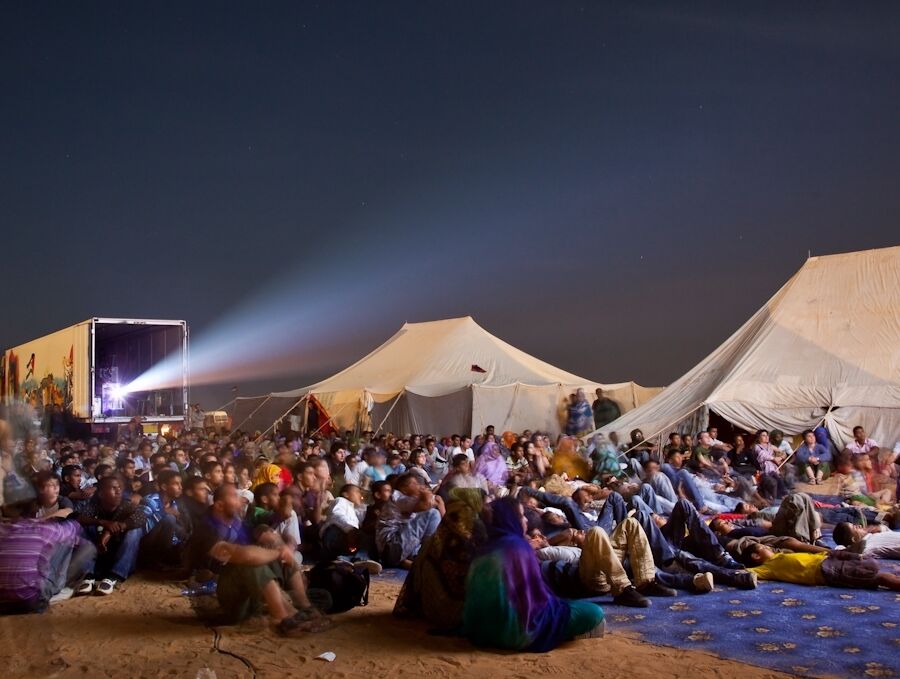
Every year, a small airplane takes off in Madrid to transport a hundred visitors to refugee camps in the middle of the Sahara Desert, where Sahrawi refugees have been living since their exile from the Western Sahara in 1975. It is here, in the middle of these refugee camps that film festival FiSahara takes place. Its first edition was in 2003 and was created by Sahrawis in the camps and Spanish civil society. Nowadays, FiSahara is an annual human rights film and cultural festival that brings entertainment and culture to the Sahrawi refugees in the camps. FiSahara seeks both to empower the Sahrawi people through film as a form of self-expression, cultural resistance and human rights activism, and to raise awareness about the situation of the Sahrawi people internationally.
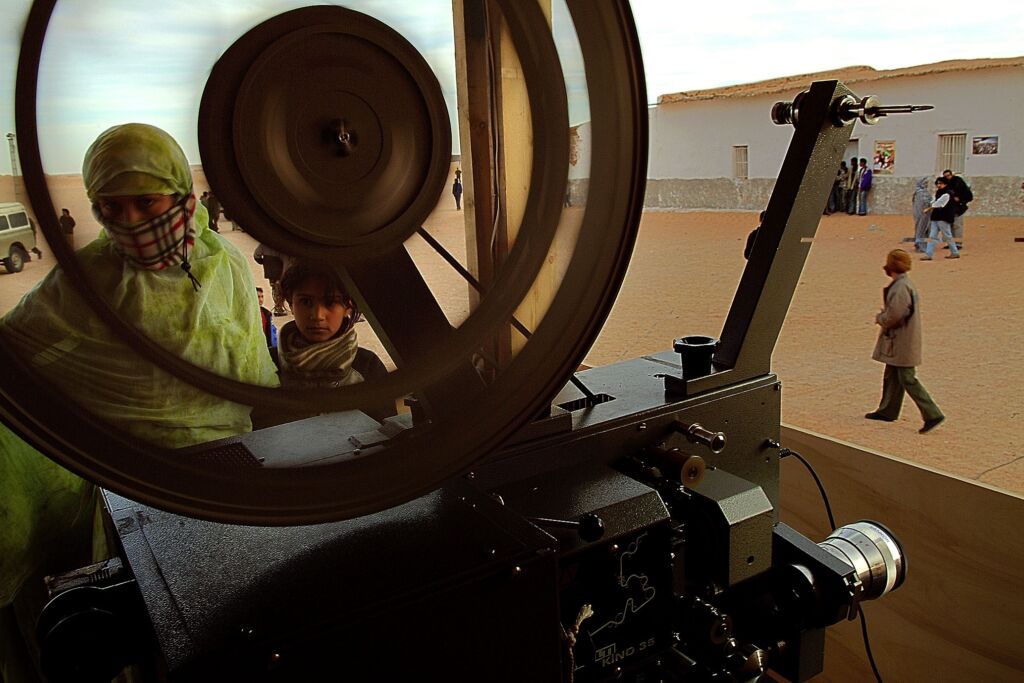
An important objective of FiSahara is to shed light on one of the most invisible conflicts in the world. After the withdrawal of Spain from the Western Sahara, the territory was invaded by Morocco and Mauritania, who brutally drove tens of thousands of Sahrawi out of their land in 1975. Exiled from their homeland, the Sahrawi settled in refugee camps located in the Algerian province Tindouf. Since then, the Sahrawis have been unable to reclaim their homeland. Although an UN-sponsored agreement in 1991 promised a referendum on self-determination and the return of the refugee population, neither promise has been fulfilled. Instead, the Western Sahara remains under military occupation of Morocco and the Sahrawi refugees have been cut off from their homeland by a militarized wall built by Morocco (supported by the US and Israel). With Morocco’s allies France and the US blocking UN resolutions, the conflict is at a political stalemate. As such the Sahrawi refugees remain in the camps to this day, still awaiting the return to their homeland in a now almost 50-year-old conflict. The less attention is being paid to the conflict, the more likely it will continue for another fifty years.
A two-sided window
FiSahara is the biggest cultural event in the Sahrawi refugee camps. Located in the heart of the Sahara Desert in Algeria, living conditions in the camps are very challenging. The refugee camps lie in a barren and complicated area with temperatures often soaring to over 50 degrees Celsius and difficulties in terms of growing crops. As a result, the refugee camps are very much dependent on humanitarian aid for basic necessities such as food and water. On top of that, the refugee camps are located in remote areas that are difficult to reach, leaving the Sahrawi refugees increasingly isolated. FiSahara aims to put the unjust circumstances of the Sahrawi refugees on the international agenda. But the festival is more than that. According to María, the festival can best be described as a two-sided window.
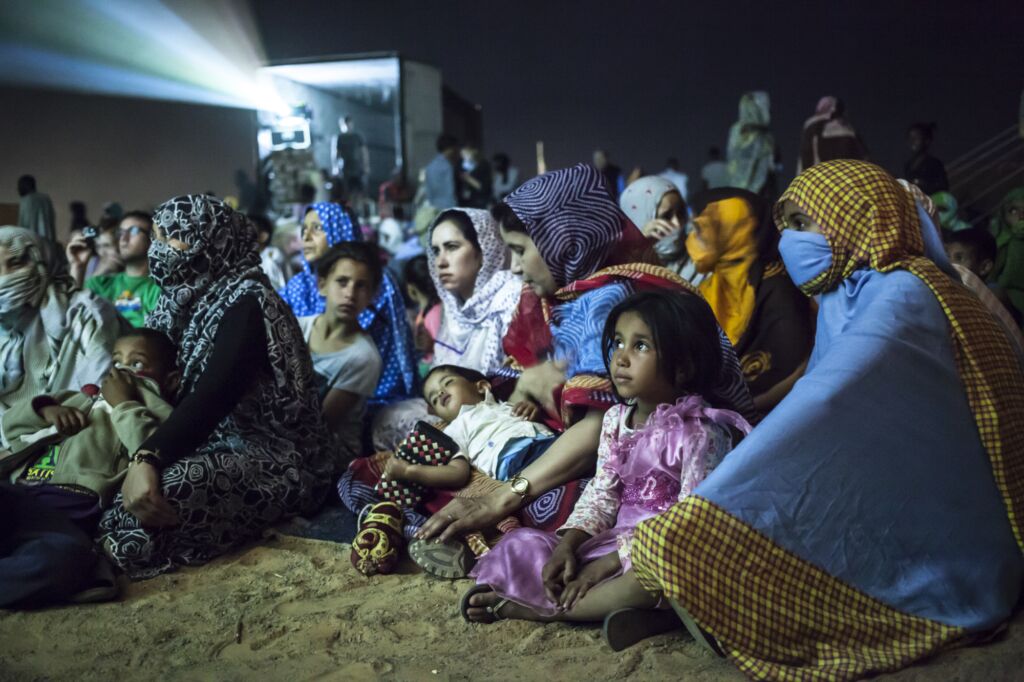
The right to entertainment and culture is a human right
On one side, FiSahara brings entertainment to the Sahrawi camps primarily through cinema. During the festival, mobile cinemas are set up for open-air film screenings in the middle of the camps and surrounded by haimas, traditional desert tents made by Sahrawi women. A great number of the films screened at the festival are about the daily struggles and the humanitarian crisis, but the festival also makes sure to include films about lighter, everyday stories from the camps. In combination with other activities, including children’s programming and concerts, FiSahara intends to bring fun and joy to the camps, which is the immediate objective of the festival. This is important, because, as María asserts ‘the right to entertainment and culture is a human right.’
A cultural solidarity project
On the other side, FiSahara is a way for outsiders to learn more about the Sahrawi culture and predicaments. Taking care to invite international filmmakers, media and human rights defenders, the festival aims to generate more understanding for the Sahrawi case by literally and figuratively transporting its visitors to their world; living with the Sahrawi families allows visitors to have a first-hand experience of Sahrawi’s living conditions and to build relationships with the Sahrawi families. Visitors will also be able to see the Sahrawi cultural traditions performed throughout the duration of the festival. Exploring the many haimas, visitors might find themselves witness of wedding rite or a tea ceremony. Thus, walking through the camps, visitors may encounter Sahrawi poetry, singing, storytelling, camel-riding and more during the festival. FiSahara therefore becomes a showcase for the world to learn about the traditions of the Sahrawi. That is important, since the Sahrawi have long struggled to retain their cultural identity under threat. As María explains: ‘The camps themselves might not be under occupation, but due to the dire circumstances, culture is not supported as much. The Sahrawi people thus have to try extra hard to be able to continue practicing their culture.’ FiSahara hence functions as an important stage on which Sahrawi culture can be showcased, shared and preserved in an exchange between the international visitors and the Sahrawi.
By opening up spaces for conversations about the plight of the Sahrawi refugees and through an exchange among different struggles, FiSahara truly is a cultural solidarity project.
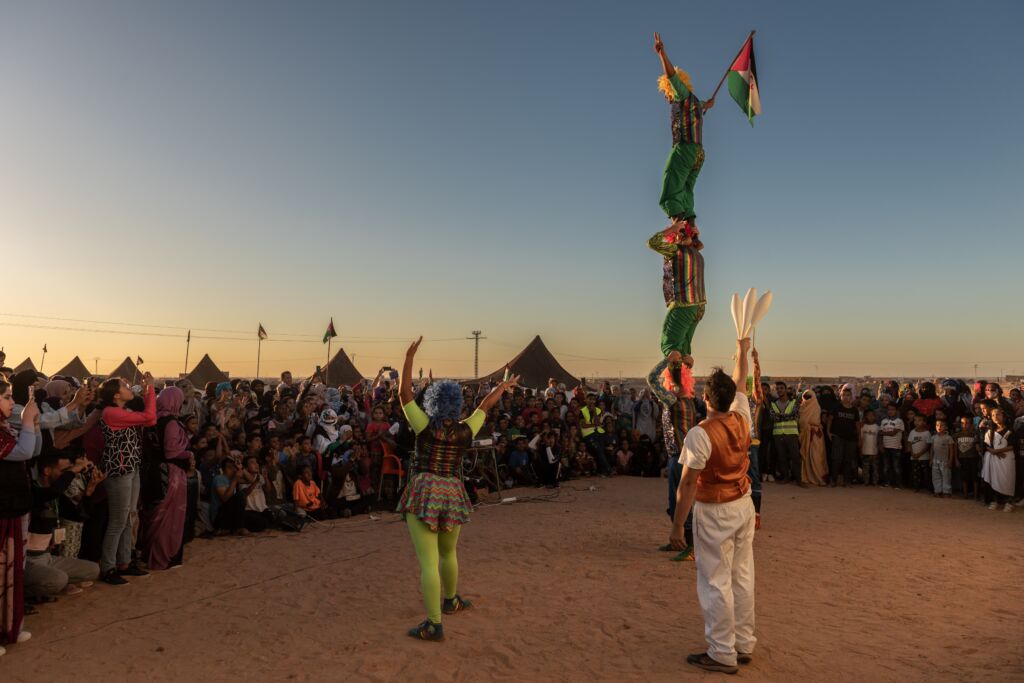
An inspiration
Considering the objectives of FiSahara, connecting with Movies that Matter has been a way to connect to the wider world of human rights films and film festivals, according to María. ‘It really was the lifeline for this community that we were able to enter and belong to, which is the network community and beyond.’ This connection is sustained not just through the Human Rights Film Network, but also through her experiences with our grant programme and several Cinema Without Borders workshops. As a former grantee, María described the webinars held by Movies that Matter for the group of grantees as a ‘chance to form community with grantees who you have never met, but who you might have a lot in common with, or who you might get great ideas from, or maybe collaborations arise from. I see that as a really hopeful project of connecting so many like-minded festivals around the world.’ On top of that, María recalls how the grants extended by Movies that Matter allowed FiSahara to establish new projects. For instance, with the support of Movies that Matter, FiSahara was able to set up a training for Saharawi school children on human rights films. In this programme, the objective was for these children to connect their own lived experiences to filmmaking, based on which the short film little Sahara was produced. ‘The film is a testament to their potential and the way they think of themselves and also insert themselves into the world and they don’t live in isolation.’ Likewise, Movies that Matter supported a workshop specifically for women to learn how to screen films to use in their advocacy and educational purposes. These women learned to become projectionists, how to moderate debates and how to talk about important topics such as breast cancer, beauty standards and feminism through cinema.
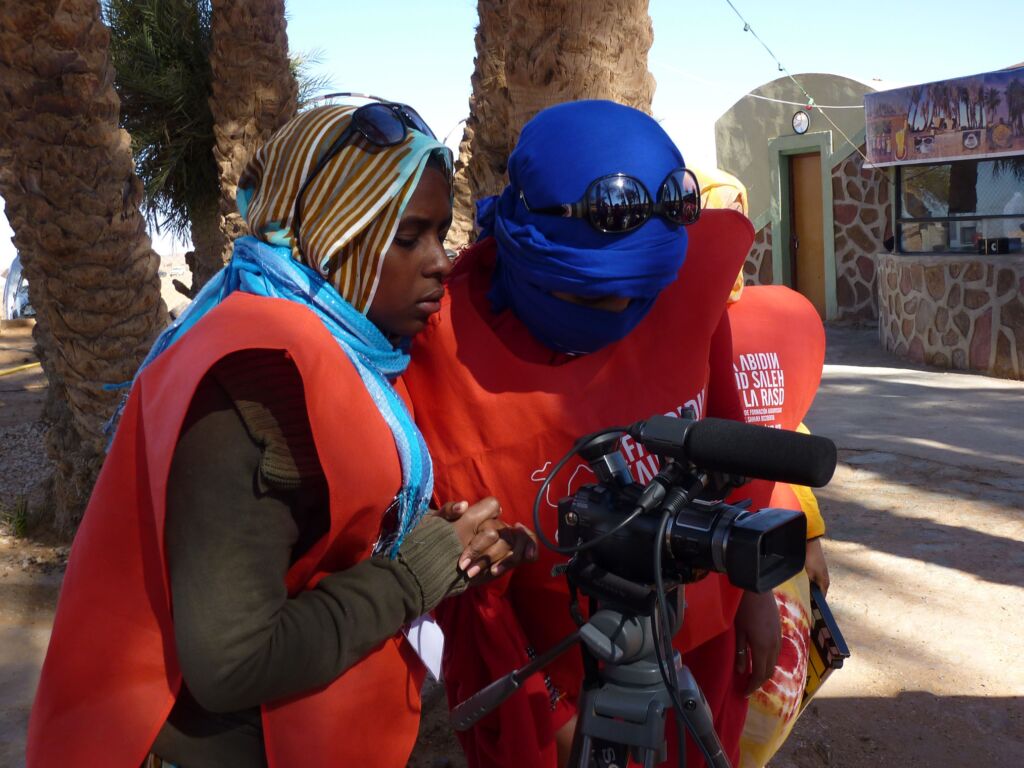
The resources provided by Movies that Matter have thus been of great help to the creation of impactful projects. On top of that, María would also describe the relationship with Movies that Matter as one of inspiration. ‘We always look to them [Movies that Matter] in terms of films and ideas and in terms of how to use films for educational purposes. It is an inspiration.’
As such, Movies that Matter supports film festivals like FiSahara, which are vital in bringing awareness to human rights crises like the one of the Sahrawi in the Western Sahara. For the future, FiSahara’s aspiration is that one day, an edition of the festival can be held in a Western Sahara that is free from occupation. In the meantime, FiSahara tries to open as many doors as possible to make that happen.
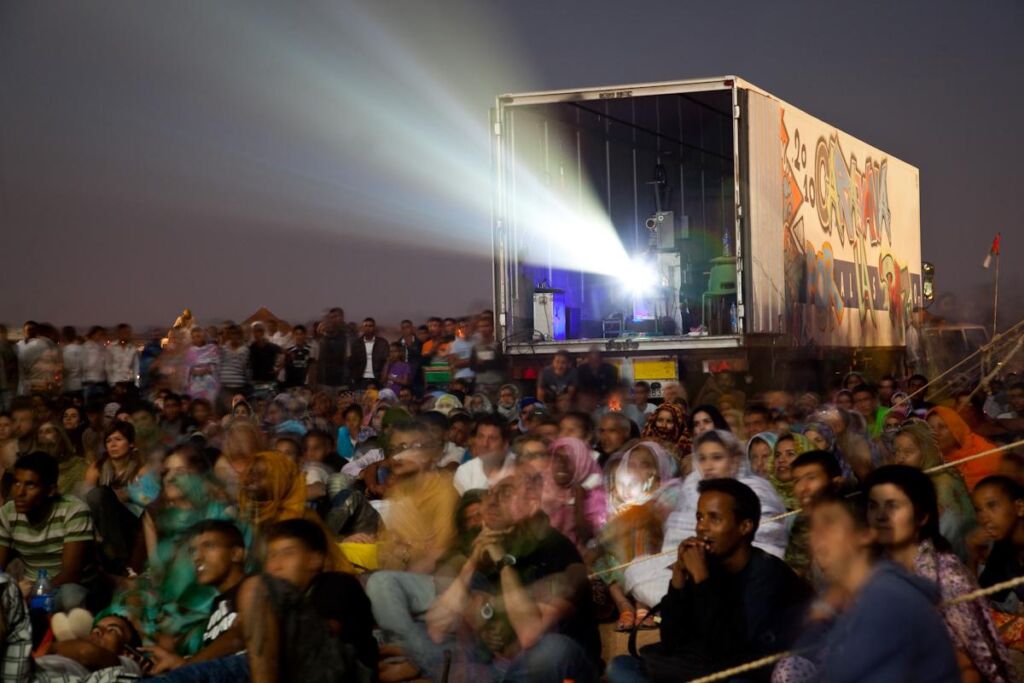
The International Support team is committed globally by financially supporting human rights film festivals (Grant Programme), film screenings at embassies (Embassy Film Menu), a programme for activists (Activist Programme), coordinating a partnership between festivals (Human Rights Film Network) and workshop programmes for film festival organisers (Cinema without Borders).